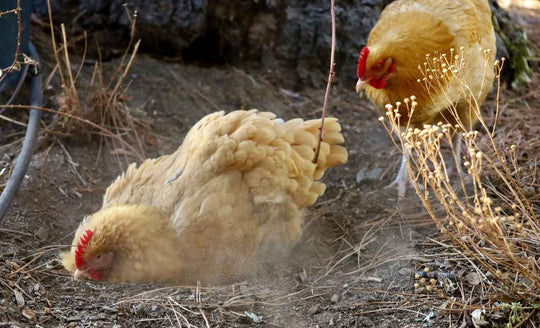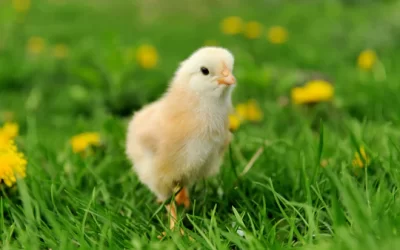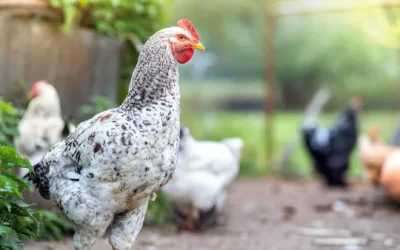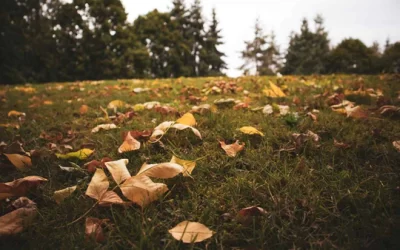What Is Frostbite?
Dust bathing is a way for chickens to clean themselves. There are a variety of purposes for dust bathing. When chickens start to feel dirty, grimy, or itchy, their instincts kick in and they dig in the soil and burrow.
They use their wings to throw dirt on themselves until they are coated in a layer of dirt. This helps absorb oil, excess moisture, and clog parasites breathing pores.
While it may sound like this ritual would make your birds more dirty and susceptible to insects, the dirt also helps absorb oil and suffocate potential parasites that lie beneath your hen’s feathers.
Why Do Chickens Dust Bathe?
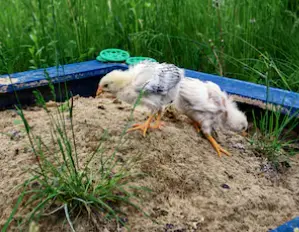 There are a variety of reasons chickens dust bathe.
There are a variety of reasons chickens dust bathe.
- Chickens use a dust bath as a way to clean themselves.
- Dust bathing works as a natural insecticide against lice, mites, and other bugs or parasites.
- Prevents future parasite infections.
- Helps exfoliate a chicken’s skin, and sheds old, loose feathers.
Chickens preen their feathers to distribute the oils they have on their bodies. Sometimes, these oil glands can get out of control, so they will use a dust bath as a way to control the amount of oil on their bodies.
Parasites can cause many problems for chickens including itching, feather loss, anemia, and death. Fortunately, chickens know how to prevent and treat these mild infestations on their own by using a dust bath.
Lastly, chickens dust bathe because they enjoy it, especially in the sun during the winter months. Chickens will pick a sunny spot that is safe from predators. They will spend about 20 minutes rolling around in the dry dirt.
Start chickens dust bathing early. Small chickens enjoy dust bathing, even if they are only a few days old. You can set up a dust bath in a small tub of dry dirt in their brooder.
When frostbite first starts to happen within your flock, it is not always obvious. The parts of your chickens that are most susceptible to frostbite are the parts that are most exposed to the elements. These include the comb, wattles, and the feet. Here is what to look for:
Stage 1: Your chickens’ skin may appear slightly reddened and be cold to the touch.
Stage 2: Further color changes to tissues occur such as lightening, whitening, and paleness.
Stage 3: Affected tissues may feel cold or hard to the touch, become numb, and show signs of muscle stiffness.
Stage 4: Blackening of the tissue accompanied by nerve damage and possible infection.
Stages 1-3, referred to as frostnip, can be reversed with proper care and by slowly warming the skin. This should be done gradually with indirect heat. For example, you may want to prepare dry bedding or wrap them in a warm, dry towel. If the feet are becoming severely affected, they can be soaked in lukewarm water in order to slowly bring their temperature back to normal.
Providing a Dust Bathing Box
Providing a place for your flock to dust bathe is very important, especially if your flock is confined to a chicken coop or chicken run. In the winter months, having access to a dust bathing area is especially important because snow or frozen ground prevents your flock from having access to dirt. If you do not provide your flock with space to dust bathe, they will find a way to create one.
Making a dust bath for your chickens also ensures that they are bathing with beneficial dirt, rather than manure, decaying matter, or anything else that may be harboring harmful bacteria.
Create a Dust Bath
First, you need to choose a suitable bathing box for your hens. Kiddie pools and sandboxes are ideal because they are shallow enough for your hens to easily climb in and out. Additionally, dust bathing is a social activity for chickens. Make sure the area you create is big enough for several chickens.
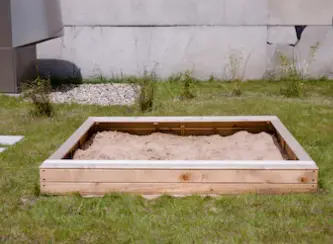
Once your box is ready to go, there are many different types of materials besides dust and dirt that you can add to your dust bathing station to make it a little more inviting to your hens.
Some of the most common dust bath additives are:
Sand
Fine sand is one of the best materials that you can mix with the soil in your hen’s bathing box. The sand acts as a natural exfoliator, which exfoliates your chicken’s skin and knocks off mites and parasites.
Diatomaceous Earth (Food Grade)
There are some chicken owners that choose not to use this due to the potential risk for humans. However, adding food-grade Diatomaceous Earth is great for killing parasites, mites, lice, fleas, and ticks. This is an especially great additive if there is a parasite problem in your flock.
*Make sure you choose food-grade Diatomaceous Earth, and that the bag says it is safe for animals.
Wood Ash
Wood ash, when used sparingly, is also a healthy additive for a bathing box due to the high presence of magnesium, calcium, and vitamin K. Fine wood ash also gets down to the base of the flock’s feathers to help clear out any unwanted pests. However, you want to use wood ash that was naturally burned in a fireplace and does not contain any remnants of lighter fluid or other chemicals that could be harmful to your chickens.
Herbs
Harness your inner DIY genius by getting creative with dried herbs! There are many types of herbs that are beneficial for chickens such as lavender, sage, oregano, mint, parsley, rosemary, and more! Dried herbs not only help to keep insects away, but they may also leave your chickens with a pleasant smell and a tasty treat as they nibble while they are bathing.
The following dried herbs are great to add to your dust bath:
Basil
Basil is great for chicken’s immune systems and digestion. It is also a great source of protein, Vitamin K, and iron. Basil is also a great dust bath additive because it repels mosquitoes and flies.
Oregano
It is known to strengthen the immune system of your flock. It also guards against poultry illnesses including salmonella, infectious bronchitis, avian flu, and e. Coli. You can also give this to your chickens fresh, or mix it dried into their daily feed.
Lavender
This herb is a natural stress reliever, which can be beneficial to the laying and sitting hens in your flock. Additionally, it will help keep insects away from your flock.
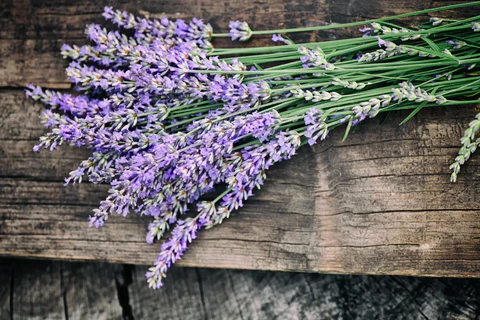
Lemon Balm
Lemon Balm is perfect for repelling rodents and insects. It is also a great stress reliever for your flock.
Mint
Mint is perfect for repelling mice and insects. It is also great for calming laying hens. It is safe to eat and also provides a natural way to lower body temperatures, perfect for keeping your hens cool in the summer.
There are a few additional ways to give this to your chickens aside from adding it to a dust bath. You can add it fresh or dried to nesting boxes or frozen in ice cubes as the perfect summer treat.
Sage
This herb is great for the overall health of your chickens. It can also act as an antioxidant and is believed to combat salmonella. You can give this herb to your flock fresh, so they can eat it as they want, or add it dried to their daily feed. It is also a great dust bath additive due to its anti-parasite effects.
Parsley
This herb is very high in nutrients, gives chickens a great vitamin boost, and also aids in blood vessel development. It is also a laying stimulant.
Marjoram
Marjoram is antibacterial and can be beneficial against harmful bacteria including e. Coli, Shigella, Staphylococcus, proteus, and Pseudomonas.
Rosemary
Rosemary is great for pain relief and the respiratory health of chickens. Additionally, it can serve as a natural pest repellent.
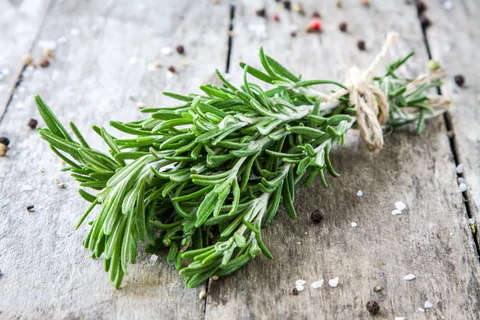
Natural Herbs are perhaps the safest way to deter pests. Check out this list of over 50 herbs that benefit chicken health!
Parsley
This herb is very high in nutrients, gives chickens a great vitamin boost, and also aids in blood vessel development. It is also a laying stimulant.
Ready-Made Dust Mix
For chicken owners who value saving time, there are a few pre-made options on the market that can be purchased.
Maintenance
Now that your bathing box is ready to go, you will want to properly keep up with maintaining a safe bathing environment. This can be accomplished by cleaning out chicken droppings on a regular basis. As well as completely refreshing the contents of your bathing station every few weeks.
Looking for more ways to take care of your chickens? Visit our store for all your chicken care supplies from coops and runs to feeders and waterers!
RELATED ARTICLES
Ultimate Guide To Raising Chicks
Raising chicks takes lots of preparation and time. If you are ready to raise chicks of your own, follow these easy steps!Be PreparedBefore you bring your chicks home, you will need to gather some supplies.Brooder A brooder is a chick's transitional home - a warm,...
How To Keep Your Chickens Cool In Summer
As summer quickly approaches, you might be wondering the best way to keep your flock cool during hot summer months. Chickens are not very good at keeping themselves cool in extreme heat conditions. In fact, chickens are better at keeping themselves warm in winter than...
Preparing Your Flock For Fall
As Fall approaches, you may be wondering what you need to do to prepare your flock for fall. Preparing Your Chicken CoopAs the weather gets cooler, is it important to ensure that your coop has no leaks in the roof or any entry point for water. Inspect your coop for...

